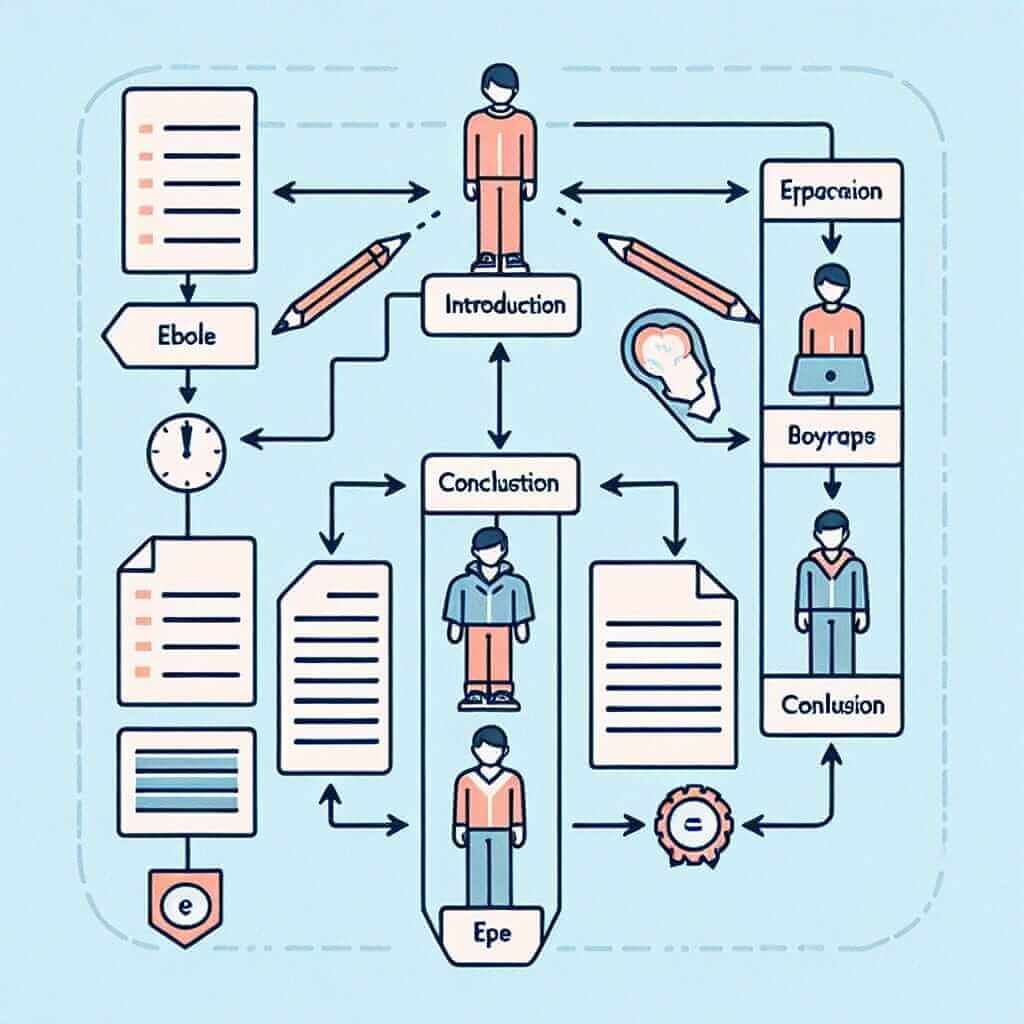Mastering the IELTS Writing Task 2 can be challenging, but a well-structured outline is your key to success. As an IELTS instructor with over 20 years of experience, I’ve seen firsthand how a strong outline can make the writing process smoother and lead to a higher band score. In this guide, we’ll explore the importance of outlining and provide a step-by-step approach to help you craft effective outlines for any IELTS Writing Task 2 prompt.
Why is an Outline Important for IELTS Writing Task 2?
Think of your outline as a roadmap for your essay. It helps you:
- Organize Your Thoughts: An outline provides a clear structure, ensuring your arguments are presented logically and cohesively.
- Save Time: Planning your essay beforehand means less time staring at a blank page and more time writing effectively.
- Stay Focused: An outline keeps you from straying off-topic, a common issue that can lower your score.
- Improve Coherence and Cohesion: A well-organized outline naturally leads to a more coherent and cohesive essay, which is crucial for a high band score.
Crafting Your Winning IELTS Writing Task 2 Outline:
1. Analyze the Question:
- Identify the Question Type: Is it an opinion essay, a discussion essay, a problem-solution essay, or something else? Understanding the question type is crucial for structuring your response appropriately.
- Underline Keywords: Pay close attention to the keywords in the prompt. These will guide your brainstorming and ensure you are addressing the task accurately.
2. Brainstorm Ideas:
- Generate Ideas: Spend a few minutes jotting down any ideas that come to mind related to the topic. Don’t worry about grammar or organization at this point.
- Select Your Strongest Points: Choose two or three of the strongest arguments or supporting points for your essay. Make sure your choices directly address the question prompt.
3. Create Your Outline Structure:
Introduction:
- Hook: Start with a sentence or two that grabs the reader’s attention and introduces the topic.
- Background Information: Provide brief context on the issue.
- Thesis Statement: Clearly state your position or the main points you will discuss in your essay.
Body Paragraph 1:
- Topic Sentence: Introduce the main idea of the paragraph.
- Supporting Evidence: Provide examples, statistics, or personal anecdotes to support your topic sentence.
- Explanation: Explain how your evidence supports your main idea.
Body Paragraph 2:
- Follow the same structure as Body Paragraph 1, but with a different supporting argument or point.
Conclusion:
- Restate your thesis in a different way.
- Summarize your main points.
- Provide a final thought, recommendation, or prediction.
Example Outline:
Question:
Some people believe that the best way to improve public health is by increasing the price of unhealthy food and drinks. To what extent do you agree or disagree?
Outline:
Introduction:
- Hook: Obesity rates are on the rise globally, leading to serious health concerns.
- Background: Governments are exploring various strategies to address this issue.
- Thesis: While increasing prices on unhealthy food and drinks may seem like a simple solution, I disagree that it is the most effective way to improve public health.
Body Paragraph 1:
- Topic Sentence: Increasing prices could disproportionately impact low-income families who may already struggle to afford healthy options.
- Supporting Evidence: Studies show that a significant percentage of low-income households rely on cheaper, less healthy food options.
- Explanation: Raising prices could exacerbate existing health inequalities.
Body Paragraph 2:
- Topic Sentence: Education and awareness campaigns are more likely to encourage long-term behavioral changes.
- Supporting Evidence: Examples of successful health initiatives that focused on education.
- Explanation: By empowering individuals with knowledge about healthy choices, they are more likely to adopt sustainable healthy habits.
Conclusion:
- Restate Thesis: While increasing prices might have a small impact, focusing on education and accessibility to healthy choices is crucial for long-term public health improvement.
- Summary: Addressing socioeconomic factors and promoting healthy lifestyles are more likely to create lasting change.
- Final Thought: Investing in preventative measures rather than punitive ones will ultimately yield better results for public health.

Tips for Success:
- Practice Regularly: Create outlines for a variety of IELTS Writing Task 2 questions to improve your speed and flexibility.
- Time Yourself: Allocate sufficient time for outlining within the overall exam time limit.
- Keep it Concise: Your outline should be a brief framework, not a full essay draft.
- Use Key Phrases: Use keywords and phrases from the question prompt in your outline to stay focused.
- Be Flexible: Be prepared to adjust your outline slightly as you write if you think of stronger points or better evidence.
Remember, a well-crafted outline is an investment in your IELTS Writing Task 2 success. By following these steps and practicing regularly, you’ll be well on your way to achieving your desired band score. Good luck!